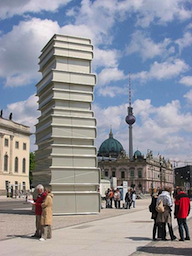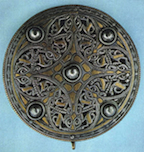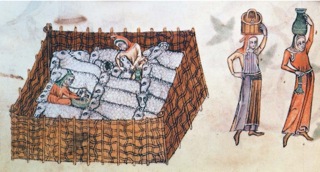Proposals for papers are being accept for the first international conference on “A New Research Agenda for Mediterranean Studies” with the theme, “Geopolitical transition in the Mediterranean: a challenge for Mediterranean Studies” hosted by the Centre de la Méditerranée moderne et contemporaine- MSH Sud-Est of the Université de Nice Sophia-Antipolis, in partnership with l’Institut Universitaire de France and Science-Po Menton, to be held at Nice & Menton on 8-9 November 2013
A maritime space which separates -and unites- three continents, the Mediterranean is also, and perhaps above all else, a representation of a series of myths that have developed throughout the centuries. These images and the transmission of these images forms the substratum behind both political actions and the main themes and directives of foreign policy. Mutual incomprehension and problems working together despite a willingness to do so, often arise from conflicts between these different representations or myths.
Recently, recalling the fact that talking about the Mediterranean does not necessarily lead to a shared memory of the area, Philippe Dugot said,”the Mediterranean is first and foremost a European idea.” This idea has, however, now become a geopolitical possibility that seems to have broken away from negative stereotypes identifying it as a space unable to adapt to a Western model perceived as a definitive goal. Within the framework of globalisation, some large scale regional associations between North and South are being created both in the Americas and in Asia. These constructions are founded on the potential to complement each other, particularly from the point of view of demography and resources, but also on common goals, particularly in ecology. The Mediterranean could thus become an area that puts together developing and developed nations giving them a voice within these larger regional assemblies that are fast becoming key forums in the ongoing globalization process.
In the context of these transformations a series of projects have seen the light – the Euro-Mediterranean partnership, the Union for the Mediterranean, which followed a series of older projects like the Inter-Parliamentary Conference on Security and Cooperation in the Mediterranean, and the 5+4 Conference – which left the impression of an excess of propositions and visions. Many differences remain and commercial exchanges between the two shores are relatively modest; only 2.3% of the European Union’s direct investments are on the Southern shore of the Mediterranean.
Various recent political initiatives seem more like propositions than programs with real concrete results. In addition, the destabilization caused by the Arab Spring, the internal collapse taking place in Syria, and the increasing strength of AQMI, have brutally recalled the fragility of this area. It is therefore necessary to place the political issues involvedbin a long-term perspective, as is shown by the determined support given bybRussia to its Syrian ally, which is part of a logic that hails back to theb1950s and even further back to Imperial Russia’s desire for navalbfacilities in the Mediterranean.
Scientific issues :
We propose an inquiry into the myths and representations that support these projects and into what lies behind the persistent difficulties encountered in trying to turn them into reality. The answer lies both in the different national policies but also in the reasoning behind the development of a Mediterranean policy for the European Union. The different ways of conceiving foreign policy, the historical traditions, the different visions associated with creation and education of elites, the role of specialized bureaucracies and the opportunities and collateral effects of Mediterranean programs are some of the elements which form representations of the Mediterranean and lead to political projects which aren’t always able to erase their different matrices. Thus, France and Italy both have strong and ancient but divergent Mediterranean policies, Germany has recently shown its desire to have a say in Mediterranean issues, and the European Union has become a fully fledged, and likely a major, actor in Mediterranean policies. In the face of these European initiatives and ambitions, it is worthwhile to look at the perceptions of the other Mediterranean rim countries, whose relationship with Europe is often conditioned by the rewriting of a recent past that is not easily forgotten and is at the origin of national myths. Algeria offers a good example of the reactions of Southern shore countries when faced with a series of policies coming from the European shore.
This analysis of the history and geopolitics of the contemporary Mediterranean is closely linked to a more general desire to reflect on the emergence of a specific field of study dedicated to the Mediterranean. With this in mind, an edition of the Cahiers de la Méditerranée (both paper and electronic editions) programmed for 2014 –peer review publication, registered by the Agence d’Evaluation de la Recherche et de l’Enseignement supérieur- will continue the work of this conference by placing its contributions in a dossier entitled “Rebuilding Mediterranean Studies ».
This international conference will therefore kick off a series of meetings that are part of the cycle “a new agenda of research for Mediterranean Studies” aimed at finding the most promising areas within Mediterranean Studies. The goal is clear, to gather researchers also involving different generations of scholars, and identify together the most promising perspectives for future study, so that they may be studied by research laboratories as well as senior researchers and their doctoral students.
*Please e-mail your proposals to the three organizers before May 15, 2013. Proposals should be short texts about 15 lines long (500 words) accompanied by a CV which includes your most recent publications and should be sent to the following e-mail addresses: pybeaurepaire@gmail.com Jean-Pierre.DARNIS@unice.fr joseph.martinetti@orange.fr
Scientific committee:
*Pierre-Yves Beaurepaire (Université de Nice Sophia-Antipolis-CMMC et
Institut Universitaire de France ; *
*Jean-Pierre Darnis (Université de Nice Sophia-Antipolis-CMMC) ; Joseph
Martinetti (Université de Nice Sophia-Antipolis-CMMC) *
*in collaboration with Anthony Jones (Northeastern University & Harvard
University)*
Pierre-Yves Beaurepaire










